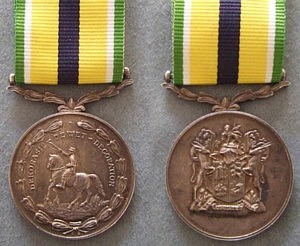Sir is a formal honorific address in English for men, derived from Sire in the High Middle Ages. Both are derived from the old French "Sieur" (Lord), brought to England by the French-speaking Normans, and which now exist in French only as part of "Monsieur", with the equivalent "My Lord" in English.

The Order of Merit is an order of merit for the Commonwealth realms, recognising distinguished service in the armed forces, science, art, literature, or the promotion of culture. Established in 1902 by Edward VII, admission into the order remains the personal gift of its Sovereign—currently Edward VII's great-great-grandson Charles III—and is restricted to a maximum of 24 living recipients from the Commonwealth realms, plus honorary members. While all members are awarded the right to use the post-nominal letters OM and wear the badge of the order, the Order of Merit's precedence among other honours differs between countries.

The Royal Victorian Order is a dynastic order of knighthood established in 1896 by Queen Victoria. It recognises distinguished personal service to the monarch, members of the royal family, or to any viceroy or senior representative of the monarch. The present monarch, King Charles III, is the sovereign of the order. The order's motto is Victoria. The order's official day is 20 June. The order's chapel is the Savoy Chapel in London.
Post-nominal letters, also called post-nominal initials, post-nominal titles, designatory letters, or simply post-nominals, are letters placed after a person's name to indicate that the individual holds a position, an academic degree, accreditation, an office, a military decoration, or honour, or is a member of a religious institute or fraternity. An individual may use several different sets of post-nominal letters, but in some contexts it may be customary to limit the number of sets to one or just a few. The order in which post-nominals are listed after a name is based on rules of precedence and what is appropriate for a given situation. Post-nominal letters are one of the main types of name suffix. In contrast, pre-nominal letters precede the name rather than following it, such as addressing a physician or professor as "Dr. Smith".
A name suffix in the Western English-language naming tradition, follows a person's surname and provides additional information about the person. Post-nominal letters indicate that the individual holds a position, educational degree, accreditation, office, or honor. Other examples include generational designations like "Sr." and "Jr." and "I", "II", "III", etc.

George Herbert Hyde Villiers, 6th Earl of Clarendon,, styled Lord Hyde from 1877 to 1914, was a British Conservative politician from the Villiers family. He served as Governor-General of the Union of South Africa from 1931 to 1937.
The orders, decorations, and medals of Canada comprise a complex system by which Canadians are honoured by the country's sovereign for actions or deeds that benefit their community or the country at large. Modelled on its British predecessor, the structure originated in the 1930s, but began to come to full fruition at the time of Canada's centennial in 1967, with the establishment of the Order of Canada, and has since grown in both size and scope to include dynastic and national orders, state, civil, and military decorations; and various campaign medals. The monarch in right of each Canadian province also issues distinct orders and medals to honour residents for work performed in just their province. The provincial honours, as with some of their national counterparts, grant the use of post-nominal letters and or supporters and other devices to be used on personal coats of arms.
The Barbados National Honours and Decorations system is similar to that of the United Kingdom. Likewise, it consists of three types of award – honours, decorations and medals. Appointments are made on a yearly basis on Independence Day by the president of Barbados.

The Jack Hindon Medal, post-nominal letters JHM, is a South African military decoration which was instituted in the Republic of South Africa in 1970 and which was only in use until 1975. It was awarded to other ranks for diligent service in the Commandos, the rural defence component of the South African Defence Force.

The De Wet Decoration, post-nominal letters DWD, is a military long service decoration which was instituted by the Republic of South Africa in 1965. It could be awarded to members of the Commandos, the rural civil defence component of the South African Defence Force, for twenty years of efficient service and good conduct. The decoration was initially reserved for officers, but it was made available to all ranks in 1986. A clasp could be awarded after thirty years service.

The Military Merit Medal, post-nominal letters MMM, is a military decoration which was instituted in the Republic of South Africa on 9 October 1974 as the Chief of the Defence Force's Commendation Medal. It could be awarded to all ranks of the South African Defence Force for service of a high order.
The following is the orders, decorations, and medals given by Governor / Yang di-Pertua Negeri of Sarawak. When applicable, post-nominal letters and non-hereditary titles are indicated. The presentation of the award was usually held at The Astana, the Governor's official residence.

The Southern Cross Medal of 1975, post-nominal letters SM, is a military decoration which was instituted by the Republic of South Africa on 1 July 1975. It was awarded to officers of the South African Defence Force for exceptionally meritorious service and particular devotion to duty.

The Pro Merito Medal of 1975, post-nominal letters PMM, is a military decoration which was instituted by the Republic of South Africa on 1 July 1975. It was awarded to other ranks of the South African Defence Force for exceptionally meritorious service and particular devotion to duty, and was the non-commissioned officers' version of the Southern Cross Medal of 1975 (SM).







